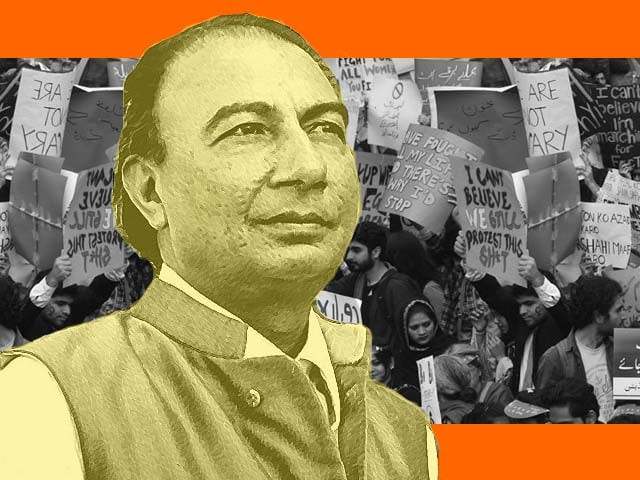Then he has given us the two poems denouncing prostitution, namely “Aurat ne janam diya mardon ko; mardon ne use bazaar diya” (Woman gave birth to Man; and Men gave her the marketplace) and “Chakle” (Brothels). There is also his poem “Nur Jahan ke Mazar Par” (At the Tomb of Nur Jahan) which posits the dead queen as the “daughter of the people” and connects it to his wider denunciation of patriarchy.
Given that today also marks International Women’s Day, and several Aurat Azadi Marches are taking place across the country, it is fitting that we also commemorate Ludhianvi by revisiting a poem which was not part of the poetry published in his lifetime; but became part of his unpublished poetry collection which was eventually published after his untimely death. Titled simply as “Aurat” (Woman), but more frequently anthologised as “Log Aurat ko Faqat Jism Samajh Lete Hen” (People Judge a Woman Merely to be a Body), it takes issue with something that is one of the centrepieces of the Aurat March in Pakistan this year, and has been severely roiling many patriarchs in Pakistan in the lead-up to March 8th – ‘Mera Jism Meri Marzi’ (My Body My Choice). Ludhianvi discusses the contradiction that whatever a woman does, a man’s ultimate criteria of judging her will be her gender and her body, not her spirit. This patriarchal attitude is not new but centuries old, persisting across time, space and culture. So much so that the woman is forced to be in a ‘no man’s land’ between life and death. Towards the end of the poem, Ludhianvi wonders aloud whether this attitude towards women is bound to persist even with the advent of modernity but, unlike many propagandist poets, he does not pontificate on a solution, which adds to the beauty and allure of the poem. Those marching for the rights of women today in Pakistan are well-primed and well-equipped to take this challenge forward in a satisfying manner. This poem is presented here in an original English translation both as a way of celebrating the feminist and communist poet that was Sahir Ludhianvi, but also as a different, albeit poetic, way to understand that the beauty of a woman ultimately lies in her spirit.
Woman by Sahir Ludhianvi
“People judge a woman merely to be a body!
That she does possess a spirit too is lost on everybody.
What the spirit is, they plainly fail to understand
For them the body’s demand is their every command
The spirit dies leaving the body to be a walking corpse
That they neither understand nor recognise this reality is beyond remorse.
For how many centuries this habit of fear has continued
For how many centuries this custom of sins has endured
People judged every scream of the woman as a song
Whether it be the time of tribes or the practice of the city throng.
The generations continue by force, bodies meet at the point of the sword
This happens among us, but not among the un-knowing birds
We the carriers of civilisation among the human brood
Would that there be anyone more barbaric in this neck of the wood?
An extinguished spirit lying within a body’s structure
I think at which place should I let my fate rupture
I am not alive in that I seek death to support my plight
Neither am I dead in that the sorrows of life take flight.
Who will tell me, who should I ask
Till when life be set in the groove of wrath, it’s quite a task
Till when the conscience of time not open its eye
That an end to this rule of cruelty and tyranny be well-nigh?”



COMMENTS
Comments are moderated and generally will be posted if they are on-topic and not abusive.
For more information, please see our Comments FAQ